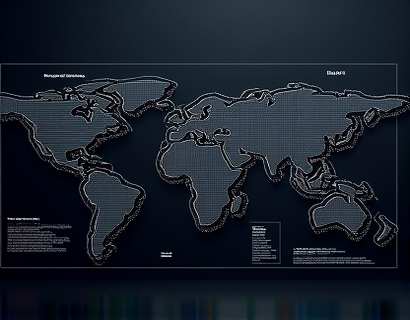Decentralized Calendar Management: Revolutionizing Productivity with Secure Blockchain Technology
In the rapidly evolving landscape of digital tools and technologies, the need for efficient and secure calendar management has become more critical than ever. Traditional calendar systems, while useful, often fall short in terms of data security, collaboration, and overall productivity. Enter a revolutionary approach to calendar management that leverages the power of blockchain technology to transform the way we handle scheduling and collaboration. This decentralized solution not only streamlines event organization but also ensures unparalleled data integrity and privacy, making it an ideal choice for professionals and organizations aiming to enhance their time management and collaborative efforts.
The core principle behind this innovative platform is decentralization. Unlike conventional calendar systems that rely on centralized servers, this blockchain-based solution distributes data across a network of nodes. This distribution ensures that no single point of failure exists, significantly reducing the risk of data breaches and system downtimes. Each participant in the network has a copy of the calendar data, which is synchronized in real-time through cryptographic algorithms. This decentralized architecture not only enhances security but also promotes transparency and trust among users.
Enhanced Security and Data Integrity
Security is a paramount concern in any digital platform, especially when it comes to managing sensitive information such as schedules and appointments. Blockchain technology addresses this by employing advanced cryptographic techniques to secure data. Every transaction, or in this case, every calendar event, is encrypted and linked to the previous one, forming an immutable chain. This means that once data is recorded, it cannot be altered or deleted without consensus from the network, ensuring the integrity of the information.
Moreover, the decentralized nature of the platform means that data is not stored in a single location, making it highly resistant to hacking and unauthorized access. Users can rest assured that their schedules and personal information are protected by robust security measures, giving them peace of mind as they manage their daily activities.
Streamlined Event Organization
The decentralized calendar management system simplifies the process of organizing events and appointments. Users can easily create, edit, and share events with minimal effort. The platform provides a user-friendly interface that allows for quick input of event details such as date, time, location, and participant list. Once an event is created, it is automatically synchronized across all connected devices, ensuring that users always have access to the most up-to-date information.
One of the standout features of this platform is its ability to handle complex scheduling scenarios with ease. For instance, users can set recurring events, manage multiple time zones, and even integrate with other productivity tools. The platform's smart contract capabilities allow for automated notifications and reminders, ensuring that no important meeting or deadline is missed. This level of automation not only saves time but also reduces the likelihood of human error.
Seamless Collaboration
Collaboration is a key aspect of modern work environments, and this blockchain-based calendar solution excels in facilitating seamless teamwork. Multiple users can access and edit the same calendar simultaneously, with changes reflected in real-time. This feature is particularly beneficial for remote teams and organizations with distributed workforces, as it eliminates the need for back-and-forth emails and ensures everyone is on the same page.
Furthermore, the platform supports role-based access control, allowing administrators to grant specific permissions to different users. For example, a team leader can invite team members to view or edit certain events while restricting access to sensitive information. This granular control over permissions enhances security and ensures that only authorized individuals can make changes to the calendar.
Improved Time Management
Effective time management is crucial for productivity, and this decentralized calendar management system offers several tools to help users optimize their schedules. The platform provides a comprehensive overview of upcoming events, allowing users to plan their day or week with precision. Advanced filtering and sorting options enable users to prioritize tasks based on urgency, importance, or custom criteria.
Another innovative feature is the integration of time-blocking techniques. Users can allocate specific time slots for different activities, ensuring a balanced and efficient use of their time. The platform also offers insights into time usage patterns, helping users identify areas where they can improve their productivity. By visualizing how time is spent, users can make informed decisions to optimize their schedules and achieve their goals more effectively.
Privacy and Compliance
In an era where data privacy is a growing concern, this blockchain-based calendar solution prioritizes user privacy and compliance with data protection regulations. All data is encrypted both in transit and at rest, ensuring that sensitive information remains confidential. Additionally, the platform adheres to stringent privacy standards, giving users control over their data and how it is shared.
For organizations, compliance with regulations such as GDPR and HIPAA is essential. This platform is designed to meet these requirements, providing tools and features that help businesses maintain compliance while managing their calendars. Users can easily manage consent for data sharing, delete data upon request, and ensure that all operations are transparent and auditable.
Scalability and Flexibility
One of the significant advantages of a decentralized calendar management system is its scalability. As the user base grows, the platform can handle increased load without compromising performance. The distributed nature of the network means that additional nodes can be added to support more users, ensuring smooth operation even during peak usage times.
Flexibility is another key benefit. The platform is designed to integrate with a wide range of third-party applications and services, making it a versatile addition to any productivity ecosystem. Whether users are already using popular tools like Google Drive, Slack, or Trello, this calendar solution can seamlessly connect with them, enhancing overall workflow efficiency.
User Adoption and Community Support
The success of any new technology depends not only on its features but also on user adoption and community support. This blockchain-based calendar platform has garnered attention from tech-savvy professionals and organizations looking for secure and efficient scheduling solutions. The open-source nature of the project encourages community involvement, with developers and users contributing to its continuous improvement.
An active community forum provides a space for users to share tips, report bugs, and suggest new features. This collaborative environment fosters innovation and ensures that the platform evolves to meet the changing needs of its users. Additionally, educational resources and tutorials are available to help new users get started, making the transition to this decentralized calendar management system smooth and hassle-free.
Conclusion
The future of calendar management is here, powered by blockchain technology. This decentralized approach not only revolutionizes how we handle scheduling and collaboration but also sets a new standard for data security and privacy. By embracing this innovative solution, professionals and organizations can significantly enhance their productivity, streamline their workflows, and maintain control over their valuable data. As the demand for secure and efficient scheduling solutions continues to grow, this blockchain-based platform stands out as a leading choice for those looking to stay ahead in the digital age.











































